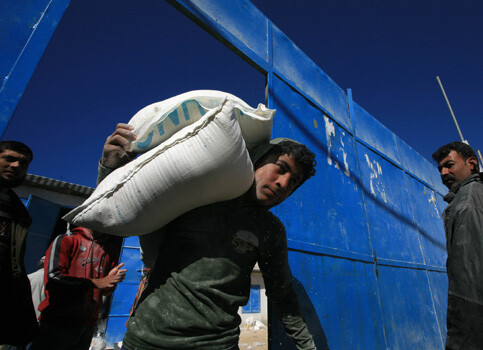The Electronic Intifada 9 February 2009

Palestinians receive food aid at a UN distribution center in a Gaza City refugee camp, February 2009. (Wissam Nassar/MaanImages)
GAZA CITY (IRIN) - Aid agencies are becoming increasingly frustrated with the difficulties of getting humanitarian supplies into the Gaza Strip.
“For us to move ahead with rehabilitation and repairs, we must get building materials into Gaza,” Christopher Gunness, a spokesman for the UN agency for Palestine refugees (UNRWA), told IRIN by telephone. “Two hundred and twenty-one schools for 200,000 children only have 40 percent of their books because we can’t get paper and glue into Gaza.”
Some $93 million-worth of UNRWA construction projects have been on hold since before Israel’s military operation in Gaza began in late December due to a lack of cement, said Gunness.
Israel’s military offensive in the Strip began on 27 December 2008 with aerial bombardments and combined with a ground assault beginning on 3 January. Israel declared a unilateral ceasefire on 18 January. Hamas declared its own ceasefire later that day. Over 1,300 people in Gaza were killed and more than 5,300 were injured during this period, according to the Gaza health ministry.
More than 21,000 homes were destroyed or badly damaged while health facilities, schools, power, water and sanitation installations, and agricultural and economic production were destroyed or seriously damaged, according to the UN.
The result has been a humanitarian crisis in the Strip, where essential items such as construction materials, pipes, electrical wires, transformers and spare parts are in short supply.
“We have had difficulties entering our education supplies, like paper,” Marixie Mercato, a UNICEF spokesperson, told IRIN from Jerusalem. “These are not problematic goods,” he added, referring to Israeli restrictions on goods entering the Strip that have security implications.
Several UN agencies and other aid organizations say Israeli authorities have a confidential list of items prohibited from entering Gaza. Certain items, such as cement and paper, are commonly denied entry. Other items are on a priority list for entry.
“The government of Israel has a priority list of items allowed to enter [Gaza],” CARE officer Juliette Seibold told IRIN by telephone in Jerusalem. “[But] people are waiting for political outcomes before we are granted access.”
Only two CARE staff members have been allowed into Gaza since 2 November, said Seibold.
Colonel Nir Press, head of the Israeli Coordination and Liaison Administration to Gaza, said that Israel feared certain items could be used for terrorist activity if they were allowed to enter.
UN flash appeal
A UN flash appeal for $613 million, issued on 2 February in Geneva to meet the urgent humanitarian needs of Palestinians in the Gaza Strip, asserts that the free and sustained movement of humanitarian supplies and personnel through Gaza’s crossings is crucial to the implementation of the response.
“Without the political pressure to improve access, the funding will not succeed,” Oxfam country director John Prideaux-Brune told IRIN by telephone.
After visiting the region, UN Secretary-General Ban Ki-moon and the UN’s Emergency Relief Coordinator John Holmes called for Gaza’s border crossings to be opened to allow humanitarian supplies and aid workers access to the Strip. They also called for the urgent humanitarian needs of the population to be separated from the political conflict.
This item comes to you via IRIN, a UN humanitarian news and information service, but may not necessarily reflect the views of the United Nations or its agencies. All IRIN material may be reposted or reprinted free-of-charge; refer to the copyright page for conditions of use. IRIN is a project of the UN Office for the Coordination of Humanitarian Affairs.


